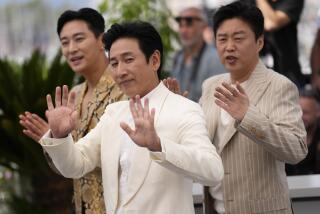DEES TO RADIO: TUNE OUT DRUGS
- Share via
Radio personality Rick Dees of KIIS-FM/AM targeted 300 radio station programmers around the country this month with a personal letter urging their support in the “fight against the glorification of drugs on radio.”
“Only you can decide what course of action is appropriate for your community, but as a minimum, I would encourage you to discuss with your on-air staff how their casual pro-drug remarks might be . . . perpetuating the glamorization of drug abuse as a natural part of the rock-music scene,” Dees wrote.
The letters were mailed Aug. 8 as part of an anti-drug effort by Dees, Gary Owens of KFI-AM (640) and 11 other broadcasters from youth-oriented radio stations in Los Angeles, New York, Chicago, San Francisco and elsewhere. They have formed Broadcasters Against Drugs, a loosely structured group.
The effort, which coincides with recent anti-drug campaigns by the White House and Congress, has the potential audience and influence to do “far more than President Reagan can” to lead young people away from drugs, Dees said.
With his internationally syndicated “Top 40 Countdown,” Dees reaches about 30 million listeners a week.
“We get 20 calls a day from other stations asking how they can get involved in (the anti-drug effort),” Dees said.
The only organized function of the broadcasters’ group has been to urge radio stations to voluntarily raise listener and deejay awareness of the dangers of drugs, Dees said, stressing that, “This isn’t a censorship campaign.”
Dees said he disapproves of deejays making jokes about being under the influence of drugs. “I don’t joke on the air about people being high at concerts and jumping off the roof,” he said. “That’s not funny. I don’t want to single out any particular station, but that’s the kind of thing I’m talking about.”
His own morning show, he said, will continue as always, noting that “I already do a lot of preaching about drugs when I’m on the air.”
He also said he disapproves of songs about drugs, but that personal stance against glamorizing drugs would not mean removing suggestive songs from his play list unless “it was something I really objected to. There’s a division of labor here, and those aren’t my decisions to make.”
Dees is slated to appear Sept. 12 before radio executives nationwide when he gives the keynote speech for the drug-and-alcohol-awareness program sponsored by the National Assn. of Broadcasters, which will be meeting in New Orleans for its annual convention.
Walt Wurfel, the senior vice president of public affairs for the broadcasters association, praised Dees for “the kind of leadership needed to influence listeners away from getting hooked on drugs and alcohol.”
Among Los Angeles radio station officials contacted, reaction to the Dees campaign ranged from support to criticism. They agreed that casual comments about drug abuse are a concern for responsible broadcasters, but some downplayed the significance of Dees’ letter.
“I agree (with Dees) on this issue,” said Phil Newmark, general manager of KPWR-FM (105.9), “but it’s not really applicable to our station. We have instructed our jocks from the beginning to be careful they don’t glamorize drug abuse.”
At rock station KLOS-FM (95.5), Jim Ladd, a deejay known for occasional on-air, drug-related double-entendres, said, “I’ve done as many musical sets and made as many comments against hard drugs as I have jokes about so-called soft drugs, but it’s not my function to censor myself on the air except in matters of taste.”
Ladd said that since station program directors were targeted by Dees’ letter, the result might be “an edict from the office” amounting to managerial censorship of deejays.
“I think anything anyone does to enhance the knowledge about drug abuse is helpful,” said KROQ-FM (106.7) station manager Tom McMillan, but added, “We’ve had meetings with our jocks to discuss cutting back on drug-related remarks way before Rick Dees’ letter.”
KROQ deejay Freddy Snakeskin expressed skepticism about Dees’ campaign.
“All this recent drug hysteria seems somewhat politically fishy to me,” he said. “Saying you’re against drug addiction is like saying you’re against rape. Who isn’t? I don’t think some comedian on the radio is going to influence a fundamental choice like that. Drug addiction is a serious problem, but people can figure that out for themselves. We need more broadcasting attention to the catastrophe of AIDS (acquired immune deficiency syndrome).”
Dees said he was equally against the misuse of alcohol--one of the most widely used drugs in the country among all age groups--but denied it was inconsistent to have alcoholic beverage producers as sponsors, such as South Pacific Lager Beer, which helped underwrite this summer’s “Beach Scene” with KIIS.
“I don’t support its misuse,” Dees said, but “Alcohol is legal. If the sponsor was Carlos’ Cocaine Fields of Bolivia, I’d stop and say, ‘Hey, wait a minute. We can’t do that.’ ”
Pointing out that one of his own teen-age relatives is an alcoholic, Dees said that young people frequently see alcohol glorified in TV and radio commercials, and that choosing sponsors is “something to think about. We’re talking about a gradual change here. I think eventually you may see a change in which sponsors are used.”
Dees defended the presence of Willard Wizeman, a constantly inebriated character Dees invented for his morning radio show.
“Willard gets a lot of laughs with his jokes,” Dees said. “He’s there to be funny, and he symbolizes the kind of obnoxious person no one wants to be like.”
More to Read
Sign up for Essential California
The most important California stories and recommendations in your inbox every morning.
You may occasionally receive promotional content from the Los Angeles Times.













